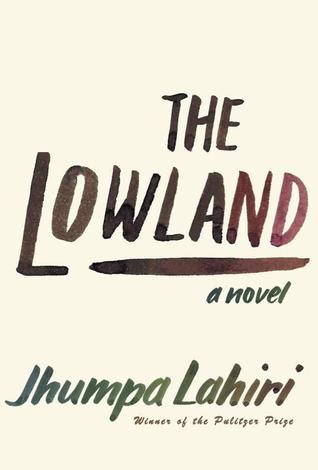Jhumpa Lahiri is a writer I would consider to be very subtle with her emotional insight. In her fourth novel, The Lowland, she ambitiously exposes readers to a complex moment in India's history, the Naxalite movement of the 1960s, and the ever painful aftermath revolutionary violence can have upon a family.
Brothers Subhash and Udayan Mitra are only separated by fifteen months, and have always been mistaken for one another desptie Subhash, the eldest, being so reserved and cautious, while Udayan the youngest, is the more precocious counterpart. Both brilliant in school, it is during their twenties that Udayan grows frustrated with post-colonial politics, and slowly becomes involved with the Naxalites of Calcutta. While always aware of their differences, it is Udayan's political zeal that slowly pushes the brothers apart, especially once Subhash leaves India to study in Rhode Island.
Impulsive and passionate, Udayan falls for quiet philosophy student Gauri, and is unceremoniously married to her, in spite of his parents wishes. Despite the hope typically implicit in expanding a family, the Mitra family grows segmented and cold with one another. Udayan crosses the line from political activist to enemy of the government, and begins to live a double life of secrets and unexplained absences, afraid even to confide in Subhash, whose temporary visa status as a student in the United States could be jeopardized. Tragedy strikes early in the novel, and the Mitra family as it remains shatters into both large and breathtakingly small pieces.
The novel is propelled forward by the amazing contrast between careful Subhash and daring Udayan; indeed, their early relationship with each other creates a lovely mirror for the two incredibly powerful ways that nations are either changed, or left to stagnate. The whole family must move on from unbelievable tragedy, and at first Subhash and Gauri believe that the only way to escape their grief is to flee India. They slowly come to realize that Udayan's absence can only eat at their hearts even more over time, especially while they struggle to make a place for themselves in the stark landscape of coastal Rhode Island.
I have always admired the truly beautiful way that Lahiri describes the powerful isolation inherent in leaving ones' home country behind, or in grieving. The Lowland is powerfully ambitious because it shows the multi-generational effects these massive life events can have upon identity. The loss of country as well as family rolls from one generation to the next, leaving empty rooms, empty houses, empty furniture, and broken hearts.
It's a beautiful novel, full of loss and emotion, brave in it's handling of three generations' differences and grieving. Lahiri calls all possible different familial roles into question, fearlessly discussing the ways we can fail others, even as we fail ourselves. It is a very sad book, but one I'm eager to recommend as it is so wonderfully crafted. It became available today, and don't forget that it is shortlisted for the Man Booker Prize of 2013! If you haven't read my review for Ruth Ozeki's shortlisted novel A Tale For the Time Being, make sure you check it out.
Brothers Subhash and Udayan Mitra are only separated by fifteen months, and have always been mistaken for one another desptie Subhash, the eldest, being so reserved and cautious, while Udayan the youngest, is the more precocious counterpart. Both brilliant in school, it is during their twenties that Udayan grows frustrated with post-colonial politics, and slowly becomes involved with the Naxalites of Calcutta. While always aware of their differences, it is Udayan's political zeal that slowly pushes the brothers apart, especially once Subhash leaves India to study in Rhode Island.
Impulsive and passionate, Udayan falls for quiet philosophy student Gauri, and is unceremoniously married to her, in spite of his parents wishes. Despite the hope typically implicit in expanding a family, the Mitra family grows segmented and cold with one another. Udayan crosses the line from political activist to enemy of the government, and begins to live a double life of secrets and unexplained absences, afraid even to confide in Subhash, whose temporary visa status as a student in the United States could be jeopardized. Tragedy strikes early in the novel, and the Mitra family as it remains shatters into both large and breathtakingly small pieces.
The novel is propelled forward by the amazing contrast between careful Subhash and daring Udayan; indeed, their early relationship with each other creates a lovely mirror for the two incredibly powerful ways that nations are either changed, or left to stagnate. The whole family must move on from unbelievable tragedy, and at first Subhash and Gauri believe that the only way to escape their grief is to flee India. They slowly come to realize that Udayan's absence can only eat at their hearts even more over time, especially while they struggle to make a place for themselves in the stark landscape of coastal Rhode Island.
I have always admired the truly beautiful way that Lahiri describes the powerful isolation inherent in leaving ones' home country behind, or in grieving. The Lowland is powerfully ambitious because it shows the multi-generational effects these massive life events can have upon identity. The loss of country as well as family rolls from one generation to the next, leaving empty rooms, empty houses, empty furniture, and broken hearts.
It's a beautiful novel, full of loss and emotion, brave in it's handling of three generations' differences and grieving. Lahiri calls all possible different familial roles into question, fearlessly discussing the ways we can fail others, even as we fail ourselves. It is a very sad book, but one I'm eager to recommend as it is so wonderfully crafted. It became available today, and don't forget that it is shortlisted for the Man Booker Prize of 2013! If you haven't read my review for Ruth Ozeki's shortlisted novel A Tale For the Time Being, make sure you check it out.




